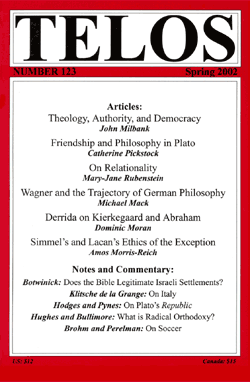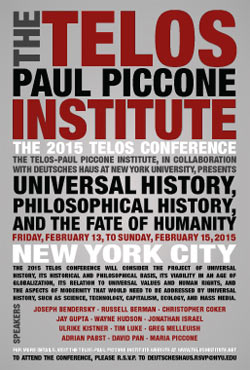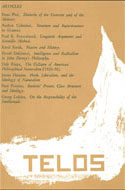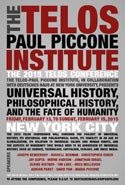By Panajotis Kondylis · Monday, November 23, 2015 The following article was originally published in the Greek newspaper To Vima on December 21, 1997, on the occasion of the 70th anniversary of the first publication of Martin Heidegger’s Being and Time.
I consider Being and Time to be one of the overrated books of the century. To be precise, I regard it as a collection of platitudes expressed in pretentious and obscure language. Whoever goes beyond the narrow philosophical perspective and surveys the history of ideas and problems in its totality arrives at this conclusion. Being very one-sidedly educated as a rule, philosophers usually inflate the importance of things that take place in their own field and consider an author original solely because he introduces them to one or two new concepts. In reality, the philosophy of the Modern Era did not create its own problematic but followed, directly or indirectly, in a better or worse manner, the rapid changes that occurred chiefly in the natural sciences to begin with, and subsequently in the social and human sciences. The epistemologically oriented philosophy of the subject was developed in the seventeenth and eighteenth centuries as an attempt to provide answers to questions raised by the mathematical physics of the time (the distinction between primary and secondary qualities, causality, substance). The social and human sciences, whose foundations were laid in the eighteenth century and which came into their own in the nineteenth, introduced a perspective that has proven fatal for philosophy’s vital myth, namely, that of the autonomy of spirit, since they demonstrated its dependence not only on “irrational” and “existential” factors but on “non-spiritual,” socioeconomic, and historical ones too.
Continue reading →
By Kyle Nicholas · Thursday, October 22, 2015  Mention “Radical Orthodoxy” in a room of people who are either quite intimately or only remotely acquainted with contemporary theology, and one surely will receive equal parts of praise and scorn. Whether it is being praised or scorned, however, it is plain that Radical Orthodoxy has worked its way deep into the fabric of contemporary theological discourse. Since the publication of John Milbank’s Theology and Social Theory in 1992, Catherine Pickstock’s After Writing in 1997, and Radical Orthodoxy: A New Theology, edited by Milbank, Pickstock, and Graham Ward in 1998, the Radical Orthodoxy movement has done what any explosively innovative intellectual movement will do after the hype settles down: mature or wither away. Mention “Radical Orthodoxy” in a room of people who are either quite intimately or only remotely acquainted with contemporary theology, and one surely will receive equal parts of praise and scorn. Whether it is being praised or scorned, however, it is plain that Radical Orthodoxy has worked its way deep into the fabric of contemporary theological discourse. Since the publication of John Milbank’s Theology and Social Theory in 1992, Catherine Pickstock’s After Writing in 1997, and Radical Orthodoxy: A New Theology, edited by Milbank, Pickstock, and Graham Ward in 1998, the Radical Orthodoxy movement has done what any explosively innovative intellectual movement will do after the hype settles down: mature or wither away.
In their article “What is Radical Orthodoxy?” (Telos 123, Spring 2002), John Hughes and Matthew Bullimore map out, in a short space and yet with crisp detail, the main themes in the Radical Orthodoxy project. For those familiar with the movement, their points will not come as a shock: that a deep metaphysical violence underlies modernity, political liberalism, and capitalism; that the philosophical and theological dualisms of modernity must be named and then overcome with the aid of both premodern and postmodern thought; and that in the face of proliferating violence it is Christian orthodoxy—in line with Aquinas, Boethius, Augustine, Gregory of Nyssa, and Iamblichean Neo-Platonism—that presents truly “radical” alternatives to the prevailing political, philosophical, and theological orders.
Continue reading →
By Jay A. Gupta · Monday, March 30, 2015  Hegel’s lectures on the philosophy of history chart the development of free, reflective self-conscious selves, but what exactly does that mean? For skeptics, it doesn’t mean much, as Hegel notoriously appears to ground this development in the development of the state. This has inspired Popper’s well-known accusations that Hegel was a puppet of the Prussian monarchy, the “enemy of the open society,” etc., etc., and that the “free” subjects of the state as Hegel describes it are anything but. Further, from Marx to Habermas, Hegel is indicted as one who adopts a quietist attitude of priestly monasticism, so while those imbued with the proper critical, historical consciousness are busy trying to change the world according to the dictates of one or another praxis philosophy, Hegel is content to contemplate it as it goes up in flames. Habermas sees in Hegel’s mature work a “blunting of critique” and a “stoic retreat” from the problems of modernity, the very ones that Habermas believes the younger Hegel so incisively diagnosed. Hegel’s lectures on the philosophy of history chart the development of free, reflective self-conscious selves, but what exactly does that mean? For skeptics, it doesn’t mean much, as Hegel notoriously appears to ground this development in the development of the state. This has inspired Popper’s well-known accusations that Hegel was a puppet of the Prussian monarchy, the “enemy of the open society,” etc., etc., and that the “free” subjects of the state as Hegel describes it are anything but. Further, from Marx to Habermas, Hegel is indicted as one who adopts a quietist attitude of priestly monasticism, so while those imbued with the proper critical, historical consciousness are busy trying to change the world according to the dictates of one or another praxis philosophy, Hegel is content to contemplate it as it goes up in flames. Habermas sees in Hegel’s mature work a “blunting of critique” and a “stoic retreat” from the problems of modernity, the very ones that Habermas believes the younger Hegel so incisively diagnosed.
Continue reading →
By Lukas Szrot · Tuesday, March 24, 2015  Given the rich and diverse history in the discipline of philosophy, many a practicing philosopher might justifiably remark that insightful philosophical inquiry must withstand the test of time. Though “The Collapse of Philosophical Naturalism” was published in Telos in 1969, many of its insights remain highly relevant to conversations that continue in philosophical and sociopolitical circles today. Dale Riepe issues a damning critique, examining four at once distinct and kindred flaws in philosophical naturalism. Given the rich and diverse history in the discipline of philosophy, many a practicing philosopher might justifiably remark that insightful philosophical inquiry must withstand the test of time. Though “The Collapse of Philosophical Naturalism” was published in Telos in 1969, many of its insights remain highly relevant to conversations that continue in philosophical and sociopolitical circles today. Dale Riepe issues a damning critique, examining four at once distinct and kindred flaws in philosophical naturalism.
Continue reading →
By Peter A. Redpath · Friday, March 20, 2015  Anyone familiar with Étienne Gilson’s teachings knows he is celebrated for: being a Thomist, his criticism of “essentialism” in philosophy, emphasizing St. Thomas’s revolutionary focus upon the principle of the act of existence (esse) within the natures of things, and a shift away from ideas to existential judgments within Western philosophical thought. Odd, then, are two claims related to Gilson made by people who knew him well. The first, from Gilson’s biographer Lawrence K. Shook, says of Gilson, “An Erasmian humanist at heart, he wanted to end all wars and to liberate men to work out their salvation in the context of personal freedom. He believed that this could be achieved through the kind of education that fostered the acquisitions of moral virtues through the writings of Cicero and Seneca.” Anyone familiar with Étienne Gilson’s teachings knows he is celebrated for: being a Thomist, his criticism of “essentialism” in philosophy, emphasizing St. Thomas’s revolutionary focus upon the principle of the act of existence (esse) within the natures of things, and a shift away from ideas to existential judgments within Western philosophical thought. Odd, then, are two claims related to Gilson made by people who knew him well. The first, from Gilson’s biographer Lawrence K. Shook, says of Gilson, “An Erasmian humanist at heart, he wanted to end all wars and to liberate men to work out their salvation in the context of personal freedom. He believed that this could be achieved through the kind of education that fostered the acquisitions of moral virtues through the writings of Cicero and Seneca.”
Continue reading →
By Kenneth Rasmussen · Thursday, March 12, 2015  Already in the first third of the 20th century, Karl Jaspers began formulating a philosophy that addressed the collapse of Enlightenment concepts of universal history and offered a perspective that could help us reformulate “universal history” as a viable concept. Jaspers’ work in this area is, I believe, underappreciated, and constitutes a realistic “cosmopolitan vision” that could help us address many of the thorny issues of global cultural conflict and diversity that we face today. Already in the first third of the 20th century, Karl Jaspers began formulating a philosophy that addressed the collapse of Enlightenment concepts of universal history and offered a perspective that could help us reformulate “universal history” as a viable concept. Jaspers’ work in this area is, I believe, underappreciated, and constitutes a realistic “cosmopolitan vision” that could help us address many of the thorny issues of global cultural conflict and diversity that we face today.
Continue reading →
|
|
 Mention “Radical Orthodoxy” in a room of people who are either quite intimately or only remotely acquainted with contemporary theology, and one surely will receive equal parts of praise and scorn. Whether it is being praised or scorned, however, it is plain that Radical Orthodoxy has worked its way deep into the fabric of contemporary theological discourse. Since the publication of John Milbank’s Theology and Social Theory in 1992, Catherine Pickstock’s After Writing in 1997, and Radical Orthodoxy: A New Theology, edited by Milbank, Pickstock, and Graham Ward in 1998, the Radical Orthodoxy movement has done what any explosively innovative intellectual movement will do after the hype settles down: mature or wither away.
Mention “Radical Orthodoxy” in a room of people who are either quite intimately or only remotely acquainted with contemporary theology, and one surely will receive equal parts of praise and scorn. Whether it is being praised or scorned, however, it is plain that Radical Orthodoxy has worked its way deep into the fabric of contemporary theological discourse. Since the publication of John Milbank’s Theology and Social Theory in 1992, Catherine Pickstock’s After Writing in 1997, and Radical Orthodoxy: A New Theology, edited by Milbank, Pickstock, and Graham Ward in 1998, the Radical Orthodoxy movement has done what any explosively innovative intellectual movement will do after the hype settles down: mature or wither away.  Hegel’s lectures on the philosophy of history chart the development of free, reflective self-conscious selves, but what exactly does that mean? For skeptics, it doesn’t mean much, as Hegel notoriously appears to ground this development in the development of the state. This has inspired Popper’s well-known accusations that Hegel was a puppet of the Prussian monarchy, the “enemy of the open society,” etc., etc., and that the “free” subjects of the state as Hegel describes it are anything but. Further, from Marx to Habermas, Hegel is indicted as one who adopts a quietist attitude of priestly monasticism, so while those imbued with the proper critical, historical consciousness are busy trying to change the world according to the dictates of one or another praxis philosophy, Hegel is content to contemplate it as it goes up in flames. Habermas sees in Hegel’s mature work a “blunting of critique” and a “stoic retreat” from the problems of modernity, the very ones that Habermas believes the younger Hegel so incisively diagnosed.
Hegel’s lectures on the philosophy of history chart the development of free, reflective self-conscious selves, but what exactly does that mean? For skeptics, it doesn’t mean much, as Hegel notoriously appears to ground this development in the development of the state. This has inspired Popper’s well-known accusations that Hegel was a puppet of the Prussian monarchy, the “enemy of the open society,” etc., etc., and that the “free” subjects of the state as Hegel describes it are anything but. Further, from Marx to Habermas, Hegel is indicted as one who adopts a quietist attitude of priestly monasticism, so while those imbued with the proper critical, historical consciousness are busy trying to change the world according to the dictates of one or another praxis philosophy, Hegel is content to contemplate it as it goes up in flames. Habermas sees in Hegel’s mature work a “blunting of critique” and a “stoic retreat” from the problems of modernity, the very ones that Habermas believes the younger Hegel so incisively diagnosed.  Given the rich and diverse history in the discipline of philosophy, many a practicing philosopher might justifiably remark that insightful philosophical inquiry must withstand the test of time. Though “The Collapse of Philosophical Naturalism” was published in Telos in 1969, many of its insights remain highly relevant to conversations that continue in philosophical and sociopolitical circles today. Dale Riepe issues a damning critique, examining four at once distinct and kindred flaws in philosophical naturalism.
Given the rich and diverse history in the discipline of philosophy, many a practicing philosopher might justifiably remark that insightful philosophical inquiry must withstand the test of time. Though “The Collapse of Philosophical Naturalism” was published in Telos in 1969, many of its insights remain highly relevant to conversations that continue in philosophical and sociopolitical circles today. Dale Riepe issues a damning critique, examining four at once distinct and kindred flaws in philosophical naturalism.  Anyone familiar with Étienne Gilson’s teachings knows he is celebrated for: being a Thomist, his criticism of “essentialism” in philosophy, emphasizing St. Thomas’s revolutionary focus upon the principle of the act of existence (esse) within the natures of things, and a shift away from ideas to existential judgments within Western philosophical thought. Odd, then, are two claims related to Gilson made by people who knew him well. The first, from Gilson’s biographer Lawrence K. Shook, says of Gilson, “An Erasmian humanist at heart, he wanted to end all wars and to liberate men to work out their salvation in the context of personal freedom. He believed that this could be achieved through the kind of education that fostered the acquisitions of moral virtues through the writings of Cicero and Seneca.”
Anyone familiar with Étienne Gilson’s teachings knows he is celebrated for: being a Thomist, his criticism of “essentialism” in philosophy, emphasizing St. Thomas’s revolutionary focus upon the principle of the act of existence (esse) within the natures of things, and a shift away from ideas to existential judgments within Western philosophical thought. Odd, then, are two claims related to Gilson made by people who knew him well. The first, from Gilson’s biographer Lawrence K. Shook, says of Gilson, “An Erasmian humanist at heart, he wanted to end all wars and to liberate men to work out their salvation in the context of personal freedom. He believed that this could be achieved through the kind of education that fostered the acquisitions of moral virtues through the writings of Cicero and Seneca.” 

